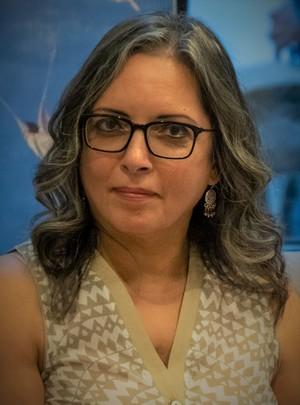Interview with Longlisted Author May Telmissany
03/02/2023

When did you begin writing They All Say I Love You and where did the inspiration for it come from?
I began writing the novel in September 2019, a few months before the Covid pandemic and finished it at the end of 2020. It was published in July 2021. Since emigrating to Canada around twenty-five years ago, I had always imagined writing about the world of emigrants in north America. Then I had the idea of two Egyptians meeting on a train, one twenty years older than the other, each of them mirroring the other in personality, their university work context and family life. From this came the idea of writing about the shared experiences of Arab emigrants in north America and different examples of those from various Arab regions suffering in one way or another from the problematics of love at a distance, whether in a marriage relationship or the relationship with their homeland. We live today in a world dominated by movement and people travelling to improve their way of life, who are affected by internal politics in their countries and rules about migration.
Did the novel take long to write and where were you when you finished it?
The writing took about a year and a half, interrupted by other academic writing, since I work as a lecturer of Arabic studies and cinema at Ottawa University, Canada. There was an overlap between my fictional writing and other academic projects; my research interests are the symbolism and contexts of migration, and the blended and transitory (transnational) cultures of nations. There was also a crossover with my interest in the history of Canadian Arabs from the end of the nineteenth century until the present day. While writing it, I was mostly in Egypt, since the pandemic gave me the chance to teach online, and I only returned to Canada for a few months. I finished writing it there, in my adopted country, while I did the final revisions in Cairo. I usually spend most of the winter there. Between Egypt and Canada, the characters of the novel moved, slept and developed, as though my fate as a writer reflected that of the characters.
Do you have writing rituals?
I only write when an idea impresses itself upon me. In my first novel, Dunyazade, which had a great reception locally, regionally and internationally, the central ideas were the feelings of motherhood and loss. In Heliopolis, I tried to recapture the 1970s in Egypt and how developments in that decade affected a middle-class Egyptian family living in the cosmopolitan district where I was born and grew up, Heliopolis. After several years, I wrote about the friendship between two women and disappointments of love and art, in A Capella. Then, when I felt burdened to write about exile and being separated from one’s homeland, I began They All Say I Love You. I wanted to write about the Arab revolutions and their effect upon emigrants, about the struggles of women and men in north America at work and the effect of this on family life. About the fine thread connecting them to their homelands, even if some have chosen not to return to the places where they were born.
At the end of the day, the ritual of writing is a sacred one for me, but it is not subject to, or conditional upon, specific times and places. I write whenever an idea is ripe and when it has been turning in my mind for several weeks. I write at night and finish before dawn. A writing session could last for up to fifteen hours, as it did when I wrote the first chapter of They All Say I Love You.
What is your next literary project after this novel?
I have two novels which are on their way to being published. Together with They All Say I Love You, they form a kind of trilogy. The characters won’t be repeated, but famous Canadian cities like Montreal, Toronto and Vancouver will have a strong presence in the next two novels, and so will the life of Arab emigrants and their interactions with Canadian characters from other origins. In this modern trilogy, I want to say that the contemporary Arab individual, with his language, culture and artistic and literary aspirations cannot in any way be separated from the larger world. He or she is an intrinsic part of this world. Boundaries melt away as perspectives unfold on essential human longings and aspirations. These may have a particularly cultural flavour, but they are not isolated from what is happening around the world. Indeed, they are powerful in this world and can leave a clear and inspiring mark in the broad realm of human culture.
